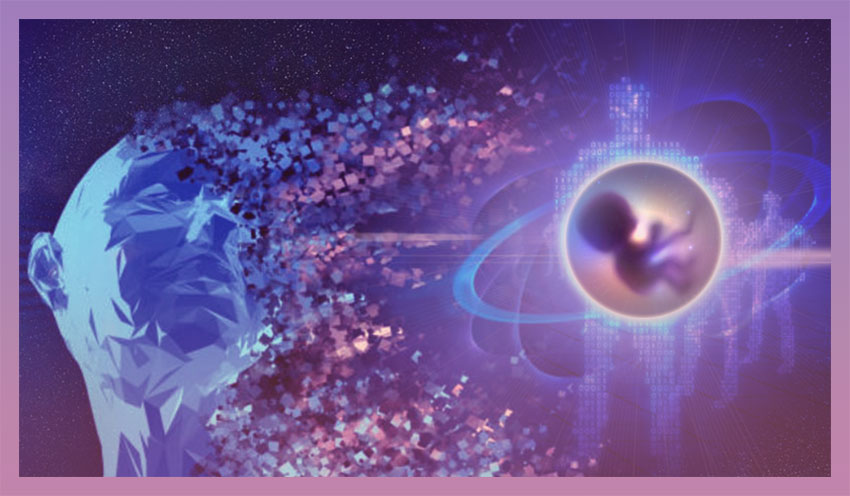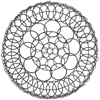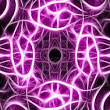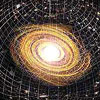The Cycle Of Necessity
 by Manly P. Hall
by Manly P. Hall
The human life wave is made up of sixty billion spirits or entities. Of this number, about two [nearly eight today] billion incarnate at one time, making up the population of the earth.
The spirit, ego, or self of the human being has been evolving through various forms and conditions for nearly a thousand million years. This vast period of time was used in the perfecting of the physical body as a medium for the expression of the entity in the physical world. The human body as we know it was first distinguishable some fifty million years ago. At that time the entity controlled the body by a rudimentary nervous system which it since has refined to its present degree of subtlety. About twenty-five million years ago the division of the sexes made sight and thought possible in the body. From that period to the present time the entity has been constantly refining the body which serves as the vehicle of its physical expression. Present humanity bears witness to hundreds of millions of years of growth which we see recapitulated in the embryo and fetus.
Millions of years of evolution lie ahead. Man is becoming human slowly but inevitably, because the subjective entity is constantly demanding better and more responsive organisms. The entire process through which the human being is passing in the mystery of growth may appropriately be termed the cycle of necessity. All growth is motivated by karma; that is, action and reaction. It is karma which makes reincarnation necessary in order that compensation may justly be administered. Man is eternally suffering, and misfortune is a constant goad impelling him forward toward a more perfect state. Karma is the law, and reincarnation is the means by which that law is administered.
It is difficult for the average person to realize the full significance of an existence that is lived on planes other than that which may be described in physical terms and that extends from the beginning to the end of time. But regardless of his actions; regardless of his virtues or vices; regardless even of his efforts to destroy himself, man is an immortal, eternal being manifesting through an infinite sequence of lives. The things that we are doing today will become the elements of later existences, bodies without end.
Yet there is no fatalism in this doctrine. Each state and condition that comes to it is the result of personal action. We make and unmake ourselves. There is no strange and distant god smiling upon some and frowning upon others. We are not the blind instruments of some fatal necessity. We are not marked by Adam’s sin. Each of us bears witness to his own character; to the thoughts and actions of lives long past. Each of us is the architect of his own tomorrow. The future is in our own hands.
It requires a little courage to acknowledge personal responsibility; to accept a belief that teaches that there is no escape from action or the consequences of action. It takes a high measure of resolve to the willing to face the world and acknowledge that all the misfortunes which occur are the results of our own mistakes. That is why the laws of reincarnation and karma have always belonged to the wise and strong, and by their very nature are not suitable to lesser intellects.
In the words of a modern psychologist it is inconceivable to the subconscious self that there ever was a time that it did not exist. Though each person lives for today, he cannot comprehend the condition of not existing. Man, though living and dying, takes eternal existence for granted. All of the higher purposes of the man, his dreams of accomplishment, his noblest aspirations, and his most powerful ambitions, demand eternity for their fulfillment.
As we look about us upon that strange aggregation of creatures that makes up society, we realize that no doctrine based upon the theory of a single life can solve the problems of this multitude. For the majority, there is little vision; the future stretches out into a mysterious and unknown expanse. Yet each of us in his innermost heart of hearts is aware of some great force that moves him relentlessly through the years toward the unknown.
Man is a creature of many sorrows; suffering is the common lot. Each in his own life knows the varied ills which arise in the chemistry of human relationships. Only the wise man can be happy; for the rest there are years of uncertainty. Why should a benign and all-knowing Providence afflict many and bless a few? Why should some come into this world diseased and crippled; others be born to every advantage? Why are some wise in childhood and others foolish in age? Who loosed sin and death upon the world that all the dreams we live by should come in the end to a common ruin?
The church says that it is the will of God. Science says that it is the law of nature. But philosophy maintains that all of these strange conditions are the growing pains of an immortal soul.
Reincarnation and karma are the only explanations for the mystery of life that the reason can embrace. These laws give purpose to action, meaning to existence. These same laws release man from the monotony of the daily routine by giving him perspective and the power to see beyond the horizon of this present life. When Gautama Buddha brought the doctrine of rebirth to India it released millions of human beings from the hopelessness of a caste system which gave opportunity to the highly born alone. When Pythagoras brought the same philosophy to Greece it freed slaves long bound to the traditions of the Attic state. Pythagoras freed his own slaves; and one of them succeeded him as head of his Academy.
Reincarnation comes to our modern world as liberation from the caste system of special privilege. It destroys our illusional concept of wealth and poverty. It breaks down the barriers that exist between employer and employee. It gives us a vision beyond wealth; a vision toward some Utopia to come in which men will dwell together in a camaraderie of purpose. Those who know men best realize that when humanity in general recognizes the law of reincarnation, which is the only teaching that will explain the true meaning of things as they are, men will immediately become more zealous in quickly putting the world in order.
In the words of Henry Ford:
I adopted the theory of reincarnation when I was twenty-six—religion offered nothing to the point—at least, I was unable to discover it.
Even work could not give me complete satisfaction. Work is futile if we cannot utilize the experience we collect in one life in the next.
When I discovered reincarnation it was as if I had discovered a universal plan. I realized that there was a chance to work out my ideas. Time was no longer limited. I was no longer a slave to the hands of the clock. There was time enough to plan and create.
The discovery of reincarnation put my mind at ease. I was settled. I felt that order and progress were present in the mystery of life. I no longer looked elsewhere for the solution to the riddle of life.
If you preserve a record of this conversation, write it so that it puts men’s minds at ease. I would like to communicate to others the calmness that the long view of life gives to us.
We all retain, however faintly, memories of past lives. We frequently feel that we have witnessed a scene or lived through a moment in some previous existence. But that is not essential; it is the essence, the gist, the result of experience, that are valuable and remain with us.
Reincarnation and karma also light the dark mystery of ethics and morality. These laws give reason to right action, revealing that every action is intimately related to the progress of the individual. We no longer do right because of scriptural admonition, but because we have learned the meaning of right and wrong as they react upon us through the law of karma. We grow through every thought and action. We learn not for one life, but for eternity. Each art and science that we master becomes part of the immortal self flowing through the ages.
It is no longer difficult to understand how genius flows from the fountains of the past, how each of us brings into this life the essence of all that has gone before. One child may play the violin at six; another may lead symphony orchestras at nine; a third, a little boy in Burma, may teach the most profound of Buddhist doctrines at the age of eight. Reincarnation and karma alone explain these phenomena, and explain also all the hidden powers and impulses, characteristics and traits, which come with us into birth.
Plato believed and taught that all learning was remembering, and the very word education originally meant to draw forth that which already was known. We all come into the world with abilities, talents, and peculiar aptitudes. We are destined to certain labors by the karma which we have brought with us out of the lives gone before.
How noble then are the doctrines of reincarnation and karma. How filled with learning is this mysterious cycle of necessity. We come into this world not to be happy, primarily, but to learn. Life after life we pass through complicated experiences until in the fullness of living we learn to grow happily. Happiness is the by-product of our harmonious adjustment to the universal plan.
Where do we exist between lives? What is the subjective state? Is the entity in heaven or in hell?
The philosopher replies that whether living or dead, man is always himself. For a time he manifest objectively, taking into himself the experience of the outer world; and then for another space of time he is subjective, assimilating into soul power the experiences of his physical existence.
According to the doctrine of rebirth we may add nothing new to ourselves in the intervals between lives. During this time we examine, order, and classify the experiences we have gained. We make them part of an immortal self that, enriched with experiences, proceeds into another body.
There are some who, hypnotized by physical existence, struggle to hold the possessions of their physical lives. Having achieved wealth, honor, and power, they forget that these temporal glories have small place in the universal plan. It is the purpose of the universe that all men should inevitably outgrow physical things. Man should realize that the inner life alone is real and permanent and all else belongs to the sphere of illusion. One of the duties of rebirth is to sever man’s will from the objects of his physical attention. As we come of age, we leave the world behind, finding nothing in the material state to be of value except the experience of self mastery.
The cycle of necessity is the endless cycle of rebirths; to be born, to die, and to be born again, century after century, age after age, until the very end of time mingles with eternity. The cycle of necessity is symbolized in the East by a spinning wheel to which human beings cling tenaciously, the ignorant clinging to the smaller life they know while the enlightened pass on to a larger life they have come to understand.
The cycle of necessity is the symbolical name which represents the great time and effort, the period of striving after truth through which each entity must pass. The laws of reincarnation and karma make possible the constant progress of all living things. Not only does man grow, but the sticks, stones, and stars grow with him. All are unfolding together; all life is growing up in space and toward space. The cycle of necessity ends at some distant, incalculable time, and life having fulfilled the pilgrimage of uncertainty comes at last to the end. This end the Buddhists call nirvana, and the Christians heaven. But names mean nothing. All such terms merely represent rest after labor; peace at the end of seeking.
Excerpt from Reincarnation: The Cycle Of Necessity
Posted in Other Topics, Past Life Therapy, Reincarnationwith comments disabled.





